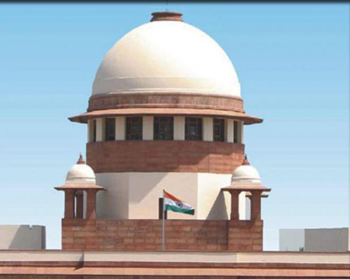Passive euthanasia draft bill ready, Centre tells SC
Mangalore Today News Network
New Delhi, Oct 11 2017, DH News: The Centre on Tuesday told the Supreme Court that it has prepared a draft bill on passive euthanasia that allowed the terminally-ill patients to withdraw the medical treatment.
 The government, however, opposed before a five-judge bench presided over by Chief Justice the concept of ’Living Will’ that allowed a person of sound mind to leave a will to stop medical treatment if there is no hope of a cure, saying it could be misused.
The government, however, opposed before a five-judge bench presided over by Chief Justice the concept of ’Living Will’ that allowed a person of sound mind to leave a will to stop medical treatment if there is no hope of a cure, saying it could be misused.
In his brief submission, Additional Solicitor General P S Narasimha submitted the draft legislation entitled as ’The Medical Treatment of Terminally Ill Patients (Protection of Patients and Medical Practitioners) Bill’ was prepared by the Union Health Ministry in June, last year.
In passive euthanasia, the medical board is free to decide if the life support system can be withdrawn but it cannot be understood as inducing the fact of death, he said. The draft bill was prepared to take the Law Commission of India’s recommendation in its reports.
The bench, also comprising Justices AK Sikri, AM Khanwilkar, DY Chandrachud and Ashok Bhushan, said that there has to be a balance between inherent individual and state interests as the right to live does not include the right to die.
“It is a duty of the State to protect its citizens. The right to live does not include right to die. Euthanasia is different from the right to die and it can be allowed in law. If we recognise right to dignity in death why not in dying process,” the bench said.
The bench also sought to know what could be the duty and responsibility of the doctors and what stage the treatment of terminally-ill patients could be withdrawn and if it should be only on the advice of a medical board.
“There is a morality issue also. If everybody is to make a living will, will it be morally and socially safe,” the court asked.
Initiating the arguments, advocate Prashant Bhushan, appearing for NGO Common Cause, said if an individual should have a right to make a declaration, when he or she is of sound mind, refusing a treatment in case he or she fell terminally ill. He said the living will is documents which allowed an individual to express the view that he would not like to prolong his treatment through an artificial process if health has deteriorated beyond retrieval.
The bench, however, asked how this living will be regulated and how its genuineness will be tested.
The court would continue to hearing argument on Wednesday.
- Kasaragod: Missing Schoolgirl and Driver Found Dead in Merkala Forest After 26 Days
- The Intriguing Story Behind Diganth’s Mysterious Disappearance!
- Tamil Nadu CM M.K. Stalin’s Wife Visits Kollur Mookambika Temple
- Mangaluru Couple Completes Mumbai-to-Mangaluru Marathon, Eyes Guinness Record
- Eminent Aloysian Alumni Award 2025 Honors Five Achievers
- Udupi: Women Have Proved Their Strength in Every Field, Says Sri Sugunendra Thirtha Swami
- Missing II PUC Student Diganth found in Udupi after 10-day search
- Daylight burglary: Gold ornaments stolen from house in Vittal
- Illegal cattle transport: Three arrested after car crash near Gangolli
- District BJP stages protest; alleges injustice to DK in state budget
- Deputy Lokayukta inspects Varamballi waste unit, Kaup dumping yard
- Attempt to deactivate mobile jammers: Case filed against 9 prisoners
- Moobidri: Teacher dies in scooter-car collision
- Devotees Flock to Prayagraj’s Sangam Even After Maha Kumbh Ends
- India Condemns Vandalism at Hindu Temple in California, Calls for Strict Action
- Delhi CM Rekha Gupta-led cabinet approves ₹2,500 monthly aid for women
- After Ranya Rao’s arrest, CBI to probe international gold smuggling ring
- In a first, all-women crew runs Vande Bharat on International Women’s Day
- Elderly woman falls after wheelchair delay, Air India flags late arrival
- Jinnah must be happy with Siddaramaiah’s budget, says CT Ravi
- Chess star to Space scientist: Women achievers take over PM Modi’s X handle
- Two women, including Israeli tourist, raped near Hampi
- Over 140 killed in clashes between Syrian forces and Assad loyalists
- Actor Ranya Rao admits to role in gold smuggling; DRI gets 3-day custody
- Relief for Siddaramaiah’s wife in MUDA case, probe agency summons cancelled
- Court remands Maoist Lakshmi to six-day police custody
- Sandhya Shenoy honored with Society for Materials Chemistry Medal-2024
- White Cornus Apartment in Mangaluru
- City girl wins first place in state-level spell bee competition
- Alleged ‘Love Jihad’ Case in Mangaluru: Woman left home voluntarily, says police
- Girl fatally struck by reckless two-wheeler near Belman
- New residential complex for the judges inaugurated in Mangaluru
- Absconding accused nabbed after 8 years
- Truck with cylinders turns turtle in Beltangady
- Bhoota Kola artist dies of cardiac arrest
- Development of the country should be our goal: Ganesh Karnik
- Container truck gets stuck under Modankap railway bridge
- Truck crushes bike’s pillion rider near BC Road
- Head constable dies of heart attack
- Udupi: PDO dismissed over financial irregularities
- CITY INFORMATION
- TRAVEL
- TOURIST INFORMATION
- HEALTH CARE
- MISCELLANEOUS




 Write Comment
Write Comment E-Mail To a Friend
E-Mail To a Friend Facebook
Facebook Twitter
Twitter  Print
Print 




